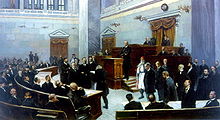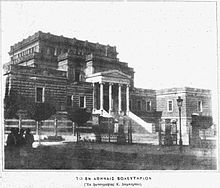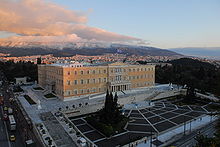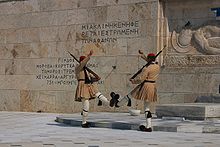- Hellenic Parliament
-
Hellenic Parliament
Βουλή των Ελλήνων
Vouli ton Ellinon
Type Type Unicameral Leadership Speaker Filippos Petsalnikos, Panhellenic Socialist Movement
since 15 October 2009Structure Members 300 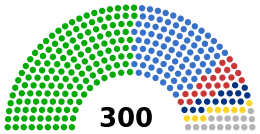
Political groups Panhellenic Socialist Movement (153)
New Democracy (83)
Communist Party (21)
Popular Orthodox Rally (16)
Radical Left Coalition (9)
Independent members (18)
[1]Elections Voting system Reinforced proportional representation Last election 4 October 2009 Meeting place 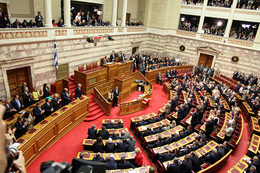
Old Royal Palace
2 Vasilissis Sofias Avenue
Athens, 100 21
Hellenic RepublicWebsite Hellenic Parliament The Hellenic Parliament (Greek: Βουλή των Ελλήνων; transliterated Vouli ton Ellinon), also the Parliament of the Hellenes, is the Parliament of Greece, located in the Parliament House (Old Royal Palace), overlooking Syntagma Square in Athens, Greece.
It is a unicameral legislature of 300 members, elected for a four-year term. During 1844-1863 and 1927-1935 the parliament was bicameral with an upper house, the Senate and a lower house, which retained the name Vouli. Several important Greek statesmen served as Speakers of the Hellenic Parliament. The List of Speakers of the Hellenic Parliament comprises all the Speakers from 1946 till today.
Contents
History
Although during the Greek Revolution a number of National Assemblies had been held, the first national parliament of the independent Greek state was established only in 1843, after the September 3rd Revolution, which forced King Otto to grant a constitution. In 1911, a revision of the constitution resulted in stronger human rights, the reinforcement of the Rule of Law and the modernization of institutions, among them the parliament. After seven years of military dictatorship, on 8 December 1974, a referendum was conducted to decide about the nature of the form of government. By a majority of 69.18%, the Greeks decided against a constitutional monarchy and for a parliamentary republic. As detailed in the following section, Members of Parliament are immune from criminal prosecution, arrest or detention while in office.
Composition and organization
Election and tenure
The Greek Parliament has 300 members, elected for a four-year term by a system of 'reinforced' proportional representation in 56 constituencies, 48 of which are multi-seat and 8 single-seat. Seats are determined by constituency voting, and voters may select the candidate or candidates of their choice by marking their name on the party ballot. However, the party receiving the largest number of votes receives 40-seat premium, which is filled by candidates of that party not declared elected on the lower rungs (the constituencies). Eligible for deputies are Greek citizens aged 18 or over on the date of the election, who are eligible to vote. With the sole exception of university professors, citizens who are public servants are disqualified from submitting their candidacies, unless they irrevocably resign their office before promulgation.
Members of Parliament are immune from criminal prosecution, arrest or detention while in office. They are also immune from having to provide any information to any authority regarding their legislative functions and deliberations. They are not immune from civil suits. Alleged crimes committed in the member's official capacity (e.g. embezzlement of public monies) may be adjudicated only after Parliament impeaches the member. Government ministers who are not members of Parliament are subject to the same procedure. The impeachment trial is held by an ad hoc Special Court. Alleged crimes committed in the member's personal capacity (e.g. homicide) may be adjudicated only after Parliament votes to have the member's immunity suspended, at the request of a prosecuting attorney and only in relation to the particular alleged crime. In such cases, the case is adjudicated by a regular court. The Parliament's permission is not necessary if a member is "caught in the act" of committing a crime (e.g. murder).
Organization
Greece 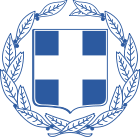
This article is part of the series:
Politics and government of
GreeceConstitutionParliament- Parliament
- Speaker
- Philippos Petsalnikos
- Presidium
- Conference of Presidents
- Parliamentary Committees
- Speaker
GovernmentJudiciary- Administrative divisions
- Peripheries
- Peripheral units
- Municipalities
Elections- Elections:
- 2006 (local)
- 2007 (legislative)
- 2009 (European)
- 2009 (legislative)
- 2010 (local)
- Political parties
- Constituencies
The business of parliament is handled by the Presidium (Προεδρείο της Βουλής), which consists of the Speaker, five Deputy Speakers, three Deans and six Secretaries. It is characterised by a tri-partisan composition, meaning that the fourth Deputy Speaker, a dean and a secretary belong to main opposition party, and the fifth Deputy Speaker and a secretary belong to the next largest (by seats) opposition party. A member of the Presidium, who must be a member of parliament, cannot be a member of the Cabinet or an Under-Secretary. While the Speaker of the Parliament and the five Deputy Speakers are elected at the beginning of each term and for the entire duration of that term, the tenure of the Deans and of the Secretaries lasts for the duration of one regular session of the Parliament for which they were elected.
Legislative process
The Parliament votes for a Bill (Νομοσχέδιο, Nomoskhedio) to become Law (Νόμος, Nomos) in three voting sessions: firstly in principle, then per article (when amendments may be proposed and either approved or rejected) and then as a whole. A "simple" (50% plus one) majority is sufficient for any such vote to pass. Once the bill is passed, it is sent to the President of the Republic to promulgate and publish in the Government Gazette. The countersignature of the appropriate government minister(s) is required. Delegation of legislative power is generally allowed, unless the Constitution provides for a situation where a Law (Nomos) is required. Laws can be found online in the National Gazette but the service works through subscription. Also, hard copies of the legislation can be obtained at the National Gazette office for a nominal fee. A private online service, the Nomos database, that again works through subscription, can be used for legislation research. There is no public database or website where one can obtain legislation. It is not published in the Parliament website either.
Recently the legislation is about to become available online through http://www.e-themis.gov.gr/
Constitutional revision
Parliament has the right to revise or amend the Constitution, except for the articles dealing with the "Form of the State" (i.e. the establishment of the presidential, parliamentary republic) and the articles safeguarding human rights and freedoms, which are unalterable. Revision of the Constitution is initiated by a motion by at least one sixth of MPs, and agreed by a supermajority of three fifths of MPs, expressed twice, in two separate votes at least one month apart. In this case, the business of revision is transferred to the next term of Parliament, i.e. after the following legislative elections. Parliament may then ratify the revision by a 50% plus one majority. If the initial motion for revision has only achieved a 50% plus one majority, then a three fifths supermajority of the new Parliament is required. A Parliament thus endowed by its predecessor with the powers of revising the Constitution is officially named a "Revisional Parliament" and is enumerated separately from "Ordinary" Parliamentary terms. In recent years, the 1974 Parliament was titled "5th Revisional", as it operated under, and amended, the 1952 constitution. The resulting constitution of 1975 was essentially an entirely new constitution, especially so since it incorporated the outcome of the 1974 plebiscite that established the presidential republic in the place of constitutional monarchy. Nevertheless it was officially deemed a revision of the 1952 one. The 1986 parliament was the "6th Revisional"; the 2001 one the "7th Revisional Parliament"; the 2004 Parliament was the "11th Ordinary Parliament" of the Third Hellenic Republic; the 2007 Parliament was the "8th Revisional Parliament"; the sitting 2009 Parliament is the "12th Ordinary". A minimum of five years must elapse after the successful conclusion of the revision process, before another may be initiated.
Parallel activities
Parliament operates its own Free-to-air television station, "Vouli TV", which broadcasts all plenary and committee sessions. When no parliamentary business is conducted, the station broadcasts a selection of films, plays, classical music concerts, opera and ballet performances and historical documentaries.
During summer recess, Parliament operates "Teenager Parliament" (Vouli ton Efivon), a series of sessions during which a rotating quota of MPs attends speeches and debates held by high school junior students from Greece, Cyprus, and the Greek Diaspora. The program carries the twin aims of alerting parliamentarians to the needs and perspectives of younger generations, and to educate teenagers in the practice of proper debating and participation in public life. Parliament also hosts official visits and tours for middle- and high-schools throughout the school year.
Parliament regularly organizes exhibitions and retrospectives on various aspects of public life, mainly dealing with aspects of political and parliamentary history.
Parliament administers the "Parliament Foundation", a research and publishing foundation established to produce printed and electronic media, mainly on archival material, historical and scientific matters pertaining to parliamentary functions and the past political and cultural life of Greece.
Seat
The original meeting place of the Hellenic Parliament was the house of Athenian magnate and politician Alexandros Kontostavlos, in central Athens, which was used for the first time after King Otto was forced to grant a constitution in 1853. A devastating fire burned down the original building, and plans were made for the construction of what became the seat of the parliament between 1875 and 1932. The new building, now called the Old Parliament House, was completed to designs by French architect François Boulanger. Pending the completion of the Parliament House between 1853 and 1871, the sessions of the parliament took place in a hastily-erected building near the Old Parliament House which became known as "the shack".
The current parliament, a neoclassical three-floor structure designed by Friedrich von Gärtner and completed in 1843, originally served as a palace for the Greek monarchs, hence sometimes still referred to as the "Old Palace" (Greek: Παλαιά Ανάκτορα). After suffering fire damage in 1909, it entered a long period of renovation. The king and royal family moved to what was from 1897 until then the Crown Prince's Palace, from then on known as the "New Palace", one block to the east on Herodou Attikou Street, while some royals continued to reside in the "Old Palace" until 1924, when a referendum abolished the monarchy. The building was then used for many different purposes — functioning as a makeshift hospital, a museum, et al. — until November 1929, when government decided that the building would permanently house Parliament. After more extensive renovations, the Senate convened in the "Old Palace" (Παλαιά Ανάκτορα) on 2 August 1934, followed by the Fifth National Assembly on 1 July 1935. Although the monarchy was restored that same year, the building has housed Parliament ever since.
The Tomb of the Unknown Soldier (Μνημείο του Αγνώστου Στρατιώτη), guarded round the clock by the Evzones of the Presidential Guard, is located in the formal forecourt of the building. Construction of the monument began in 1929 and it was inaugurated on March 25, 1932.
The main Chamber of Parliament, on the ground floor, is amphitheatrical in layout, and is panelled in purple and purple-veined white marble, with inlaid gold ornaments. Seating for the MPs is arranged in five circular sectors. The Speaker's Chair, the lectern, the ministerial and state functionary benches, and the stenographers' vault are made of carved wood and are laid out facing the MP seats. A colonnaded balcony surrounds the upper tier of the Chamber and is used as the visitors' gallery. Part of it served as the Royal Box in the past. A vitrail roof provides natural light during daytime.
An almost identical, but smaller-scaled, Chamber was built in the second floor for use of the Senate. Since there has not been a Senate for several decades, this Chamber has no official function any more, and is used for party caucuses and other parliamentary or party functions on an ad hoc basis.
The building has two main entrances, the west-facing formal entrance, which faces the Tomb of the Unknown Soldier and Syntagma Square, and the east-facing business entrance, which faces the National Gardens. Improvements are ongoing, some of them significant (such as the addition of an 800-vehicle underground parking structure), to ensure that the building can continue to function effectively. Despite renovations, parliamentary functions have outpaced the capacity of the listed building, and some ancillary services have moved to nearby offices around Syntagma Square.
Current composition
Following the 4 October 2009 general elections, the Hellenic Parliament was composed of five parliamentary groups. After repeated expulsions and resignations of individual MPs from the established parties due to the Greek debt crisis, the number has risen to nine (5 officially recognised and 4 unrecognised by the Hellenic Parliament).
Officially recognised parties of the Hellenic Parliament:
-
- Leader: George Papandreou
- MPs: 153
-
- Leader: Antonis Samaras
- MPs: 83
-
- Leader: Aleka Papariga
- MPs: 21
-
- Leader: Georgios Karatzaferis
- MPs: 16
-
- Leader: Alexis Tsipras
- MPs: 9
Officially unrecognised parties of the Hellenic Parliament:
-
- Leader: Dora Bakoyannis
- MPs: 4
-
- Leader: Fotis Kouvelis
- MPs: 4
- Panhellenic Citizen Chariot
-
- Leader: Giannis Dimaras
- MPs: 1
- Free Citizens
-
- MPs: 1
-
- MPs: 8
See also
- Hellenic Youth Parliament
- Vouli Tileorasi
- Boule (Ancient Greece)
References
- ^ "MPs Per Parliamentary Group". www.hellenicparliament.gr. http://www.hellenicparliament.gr/en/Vouleftes/Ana-Koinovouleftiki-Omada/. Retrieved 19 August 2011.
External links
- Official website of the Hellenic Parliament
- History of the Hellenic Parliament Building
- The Parliament Building (Old Palace)
- The Western Portico
- Parliament in full session
- Nighttime illumination
Coordinates: 37°58′31″N 23°44′13″E / 37.97528°N 23.73694°E
Parliament of Europe Sovereign
states- Albania
- Andorra
- Armenia
- Austria
- Azerbaijan
- Belarus
- Belgium
- Bosnia and Herzegovina
- Bulgaria
- Croatia
- Cyprus
- Czech Republic
- Denmark
- Estonia
- Finland
- France
- Georgia
- Germany
- Greece
- Hungary
- Iceland
- Ireland
- Italy
- Kazakhstan
- Latvia
- Liechtenstein
- Lithuania
- Luxembourg
- Macedonia
- Malta
- Moldova
- Monaco
- Montenegro
- Netherlands
- Norway
- Poland
- Portugal
- Romania
- Russia
- San Marino
- Serbia
- Slovakia
- Slovenia
- Spain
- Sweden
- Switzerland
- Turkey
- Ukraine
- United Kingdom
- (England
- Northern Ireland
- Scotland
- Wales)
States with limited
recognition- Abkhazia
- Kosovo
- Nagorno-Karabakh
- Northern Cyprus
- South Ossetia
- Transnistria
Dependencies
and other territories- Åland
- Faroe Islands
- Gibraltar
- Guernsey
- Jan Mayen
- Jersey
- Isle of Man
- Svalbard
Other entities - European Union
Major landmarks of Athens - Academy
- Acropolis
- Acropolis Museum
- Ancient Agora
- Arch of Hadrian
- Areopagus
- Monument of Lysicrates
- Hellenic Parliament
- Kerameikos
- Mount Lycabettus
- Monastiraki
- Kapodistrian University of Athens
- National Archaeological Museum
- National Gardens
- National Library of Greece
- National Theatre
- Odeon of Herodes Atticus
- Old Parliament House
- Olympic Sports Complex
- Panathinaiko Stadium
- Pedion tou Areos
- Philopappos Hill / Monument
- Plaka
- Pnyx
- Presidential Palace
- Stoa of Attalos
- Temple of Hephaestus
- Temple of Olympian Zeus
- Theatre of Dionysus
- Tower of the Winds
- Tsisdarakis Mosque
- Zappeion
Categories:- History of Athens
- Landmarks in Athens
- Hellenic Parliament
- Legislative buildings in Europe
- Neoclassical palaces
- Unicameral legislatures
- Parliaments by country
- 1843 establishments in Greece
- Parliament
Wikimedia Foundation. 2010.

